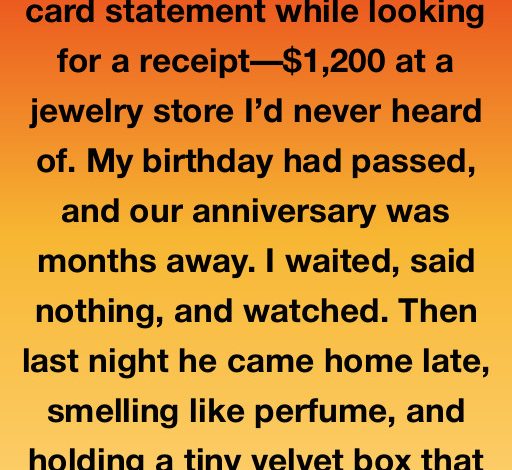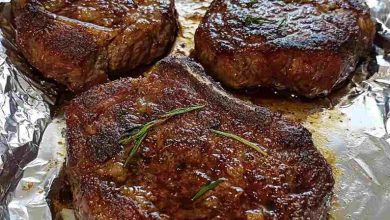The Velvet Box And The Hidden Truth

ADVERTISEMENT
It started with a credit card statement I wasn’t meant to see—$1,200 at a jewelry store I didn’t recognize. My birthday had passed. Our anniversary was months away. I tucked the detail into the quiet part of my mind where suspicions go to wait.
ADVERTISEMENT
Then came the late nights. Traffic, meetings, excuses. And a perfume I didn’t wear. I watched. I waited. Until one evening, he walked through the door with a small velvet box. I stood in the kitchen, rehearsing my smile. But he didn’t stop. He handed the box to our daughter.
ADVERTISEMENT
“For your audition,” he said. “Confidence.”
Emily’s eyes filled. “Thank you, Dad.”
I made my face behave. Later, after she went upstairs, I asked about the gift—without naming the price.
“I know it was a lot,” Mark said. “She’s been working hard. I wanted her to feel special.”
It wasn’t the answer I feared. But something still felt off. The perfume lingered. So did the unease. I started noticing things: the mileage on his car, a dry-cleaning slip for shirts I hadn’t seen. The slow drift of someone turning away.
When he said “late again,” I followed.
It felt petty. But the need to know has its own gravity. He drove to a neat little house across town. Twenty minutes later, a woman in a red coat met him at the door. She laughed, touched his arm, leaned in. They disappeared inside.
I drove home in a fog. The next day, I found her on Facebook. Same coat. Same smile. I messaged her:
I believe you’ve been seeing my husband. Can we talk?
Her reply came an hour later:
I had no idea. He told me he was divorced.
We met at a café. She was younger. Pretty in the way of someone who hasn’t been told enough times. She slid her phone across the table—texts, photos, a life running parallel to mine. He’d told her he was separated. Staying for his daughter’s sake. I believed her. She hadn’t made vows to me.
That night, after Emily went to bed, I told him I knew. He didn’t deny it. Apologies came in waves: he was sorry; he loved me; it didn’t mean anything. I handed him the duffel I’d already packed.
“You can explain it to your daughter tomorrow,” I said. “You won’t be staying here tonight.”
He left. I sat on the couch, not crying, just listening to the quiet relearn my name.
In the morning, I told Emily we were separating. She nodded, went to her room, came back and curled beside me.
“I kind of knew,” she whispered. “The perfume. The weirdness.”
She thought it might be her fault. That maybe he’d pulled away because of her. I held her close and said the only thing that mattered:
“This has nothing to do with you.”
The weeks that followed were a blur of paperwork and logistics. But they were also the beginning of something else. I signed up for yoga. Took a part-time job at the bookstore down the street—a place that smelled like paper and quiet kindness. I wrote until my wrist ached: angry pages, grateful pages, pages that were both.
Then came an email—from the woman in the red coat. After I’d asked him to leave, he’d tried to go back to her. Told her I was dramatic. Said I was blowing things out of proportion.
She said no.
Meeting me, she wrote, had made her realize she deserved better too.
I cried for a stranger who wasn’t a stranger anymore.
On the day of Emily’s audition, she fastened the necklace around her throat. We sat on a bench in the school hallway, her knee bouncing against mine.
“I’m glad you left him,” she said.
“Me too,” I replied. And meant it.
She got into the program. I learned that peace isn’t a door you walk through—it’s a room you build, one corner at a time. The yoga helped. The bookstore helped. Time helped. So did a quiet parade of choices that added up to believing myself again.
A month later, she texted me from backstage: I’m on.
I typed back a string of hearts and You’ve got this.
And realized I meant it for both of us.
People talk about gifts—how they come in boxes, how they’re meant for certain hands. But sometimes, the gift isn’t the thing you unwrap. It’s the clarity that stares you down when the box isn’t yours. It’s the prickle at the back of your neck. It’s the moment you stop shrinking to fit someone else’s story.
If you’re waiting for a sign: this is it.
Trust your gut. Count the miles. Name the ache. Choose yourself—gently, and without apology.
And if you’re worried that choosing yourself is selfish, ask the girl with the necklace who got to see her mother stand up and mean it.




